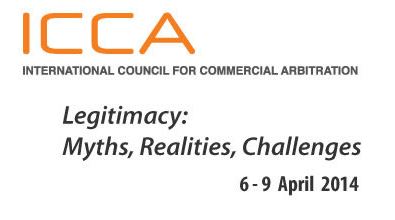 Investment arbitration is a growing and important area of law, in which states and companies often find themselves involved in. In recognition of the one year anniversary of Investment Claims moving to a new platform, we have created a quiz we hope will test your knowledge of arbitration law and multilateral treaties. Good luck!
Investment arbitration is a growing and important area of law, in which states and companies often find themselves involved in. In recognition of the one year anniversary of Investment Claims moving to a new platform, we have created a quiz we hope will test your knowledge of arbitration law and multilateral treaties. Good luck!
Your Score:
Your Ranking:
Investment Claims (IC) is an acclaimed service for both practitioners and academic users. Regular updates mean that subscribers have access to a fully integrated suite of current and high quality content. This content comes with the guarantee of preparation and validation by experts.
Oxford University Press is a leading publisher in arbitration law, including Investment Claims, latest books from thought leaders in the field, and a range of other journals and online products. We publish original works across key areas, from international commercial arbitration to investment arbitration, dispute resolution and energy law, developing outstanding resources to support practitioners, scholars, and students worldwide. For the latest news, commentary, and insights follow the Commercial Law team @OUPCommLaw, and the International Law team @OUPIntLaw on Twitter.
Subscribe to the OUPblog via email or RSS.
Subscribe to only law articles on the OUPblog via email or RSS.
Image credit: ICJ Robes, by International Organisation. Public domain via Wikimedia Commons.
The post How much do you know about investment arbitration? appeared first on OUPblog.

By Borzu Sabahi and Diora Ziyaeva
Contracts for exploitation of natural resources are usually awarded to foreign investors following demanding bidding processes during which the host government carefully vets qualifications of foreign investors. The process is designed to ensure that the investor has, among other things, sufficient expertise and resources to work on the project. Usually, such contracts and the relevant legislation require foreign investors to obtain approval or authorization from the host government before transferring or assigning the shares or farming-out any interest in the project to third parties. Moreover, from the host government perspective the authorization provisions are important for a variety of reasons, be it the national interests or compliance with the host State’s laws and regulations. While transactional and corporate lawyers are familiar with these provisions, the international investment arbitration community has not delved into this issue until recently.
Significantly, these provisions have been at the center of at least two investment treaty arbitrations raising questions as to whether failure to comply would be a basis for dismissal of claims. The ICSID tribunals in Vannessa Ventures Ltd v Venezuela, Award, ICSID Case no. ARB(AF)/04/6; IIC 572 (2013), 16 January 2013 and Occidental Petroleum Corporation v Ecuador, Award, ICSID Case No. ARB/06/11; IIC 561 (2012), 5 October 2012 took contradicting positions on this issue.
In Vannessa Ventures, a Canadian company, Placer Dome, had acquired a gold concession from the Venezuelan government. Immediately after the company started exploitation, global gold prices significantly dropped making the operation unprofitable. Placer Dome then first suspended the project (by entering into an Extension Agreement for a year with Corporacion Venezolana de Guayana or CVG, a Venezuelan government agency) and then sought various ways to transfer its shares in its local subsidiary (PDV) which was party to the concession to a third party. In order to transfer its stake though, under various agreements that Placer Dome and PDV had entered into with CVG, Placer Dome required prior approval of CVG. For example, a 1991 Shareholder Agreement provided that: “Except as otherwise provided in this Agreement, neither party may assign any of its rights or delegate any of its duties under this Agreement without first obtaining the prior written consent of the other party which shall not be unnecessarily withheld…” Placer Dome ultimately transferred its shares to a Canadian company, Vannessa Ventures (Vannessa), without obtaining approval of CVG leading to CVG terminating the concession. Vannessa then filed a claim against Venezuela alleging that Venezuela’s termination of the gold concession violated various provisions of the Canada-Venezuela Bilateral Investment Treaty.
The tribunal first held that Placer Dome’s contracts with CVG had an intuitu personae nature, meaning that due to the complex selection process the identity of Placer Dome was a material element in the conclusion of the contracts. Further, Vannessa had a radically weaker technical and financial profile than Placer Dome. But, the majority still considered Claimant’s ownership of PDV shares as qualifying investments within the meaning of the Bilateral Investment Treaty. Nevertheless, the tribunal ultimately held that because of the unauthorized transfer of the shares the claims must fail and dismissed the case in its entirety. The tribunal noted that, under the Extension Agreement, Placer Dome was supposed to work together with CVG to find a third party to join them but Placer Dome did not consult with CVG. This breach justified Venezuela’s subsequent decision to terminate the concession.

Gold. La Gran Sabana, near Santa Elana, Bolivar State, Venezuela. Photo by Rob Lavinsky, iRocks.com – CC-BY-SA-3.0, via Wikimedia Commons
In Occidental v. Ecuador, Occidental Petroleum, a US company, entered into a Participation Contract (a type of production sharing agreement) with Petroecuador in order to explore and exploit hydrocarbons in Block 15 of the Ecuadorian Amazon region. A year later, Occidental sought to explore ways to finance the expansion of its operations in Ecuador and entered into a farm-out agreement whereby it assigned a 40% economic interest in Block 15 to another energy company (AEC) in return for certain capital contributions. Such assignment, however, both under the Contract and Ecuador’s Hydrocarbons Law required government approval. As a result, Ecuador subsequently terminated the Participation Contract by issuing a Caducidad Decree as contemplated in the Contract and the Law for violation of the prohibition against assignment.
Occidental argued that it was not in breach because it remained the legal owner in the contract vis-a-vis the State, and it had only transferred the equitable interest. Occidental lost on that issue. The tribunal noted that the assignment, although not in bad faith, violated Clauses 16.1 and 16.2 of the Contract and Ecuador’s Hydrocarbons Law, which required prior government approval.
Despite the above ruling, the tribunal held that the termination of the Participation Contract was a disproportionate response to Occidental’s assignment of rights; there were a number of alternatives to terminating the Participation Contract and the latter should have thus been a measure of last resort. The tribunal also found that Ecuador did not suffer “any quantifiable loss” from the assignee’s taking an economic interest in the relevant block under the Concession. Applying these findings, the majority awarded Occidental damages in the amount of US$1.77 billion plus interest. Ecuador filed a request to annul the decision, which is currently pending.
Comments
At the center of both disputes are transfers of shares (Vannessa Ventures) and beneficial interests (Occidental) without government approval. The outcomes of the two cases, however, are worlds apart, as in the former investors went home with nothing and in the latter with an award worth more than US$2 billion.
The divergent outcomes warrant a closer look at the main issues in the two cases. Contracts and domestic laws generally contain sanctions for non-compliance with such provisions. For example, in the case of Ecuador, the Participation Contract as well as the Ecuadorian Hydrocarbon Law granted the right of Caducidad or cancellation of the contract to the State Party. Similarly, in Vannessa, the State party to the contract had a right to terminate the concession for the breach. Both tribunals held that Claimant’s failure to secure government approval violated the respective contracts and or the laws.
A more complex issue, however, is determining the effect of such violations in international law or more specifically on the Claimant’s right to bring a claim. The majority of both tribunals did not see any reason to dismiss the case for lack of jurisdiction. The concurring arbitrator in Vannessa had suggested that such violation would breach the treaty provision requiring investments to be made in accordance with the laws of the host State. The Vannessa tribunal appears to have treated the issue as one of admissibility, dismissing the case at the merits stage. Occidental did not dismiss the case for lack of jurisdiction either, but engaged in another layer of unprecedented analysis examining whether the State’s termination of the Participation Contract was a proportionate response to the assignment, ultimately finding that it was not.
The diverging outcomes of the two cases do not provide consolation either for foreign investors or the host governments. It remains to be seen whether the Occidental award will survive the annulment proceedings. The issues to consider are, among others, what effect the breaches and subsequent terminations have on the property interests that had been transferred. The majority in Occidental considered the transfer “inexistent” or void as a result of Ecuador’s termination of the Participation Contract, which worked for the investor because, although the investor was in breach of the Participation Contract due to unauthorized assignment of 40% interest to AEC, it still recovered damages for 100% of its interest in the project. Professor Stern criticized the position of the majority, stating that the farm-out should have been considered valid and binding until declared otherwise by the competent court and that Occidental was only eligible for 60% of the damages.
Dr Borzu Sabahi and Ms Diora M. Ziyaeva are both Associates at Curtis, Mallet-Prevost, Colt & Mosle LLP.
Disclaimer: The authors are attorneys at Curtis, Mallet-Prevost, Colt & Mosle LLP. The views expressed in this note are exclusively those of the authors and shall not be attributed to Curtis, Mallet-Prevost, Colt & Mosle LLP or its clients.
Investment Claims is a specialist service providing researchers with access to a fully integrated and updated suite of arbitration awards and decisions, bilateral investment treaties, multilateral treaties, journal articles, monographs, and arbitration laws.
Subscribe to the OUPblog via email or RSS.
Subscribe to only law articles on the OUPblog via email or RSS.
The post Unauthorized transfer or assignment of interests or shares in investor-state arbitration appeared first on OUPblog.


By Rachel Holt and Jo Wojtkowski
Oxford University Press is excited to be attending the twenty-second International Council for Commercial Arbitration (ICCA) conference, to be held at the InterContinental Miami, Florida, on 6-9 April 2014. This year’s theme, “Legitimacy: Myths, Realities, Challenges” gives opportunity for practitioners, scholars and judges to explore the issues surrounding, what has been dubbed by some, the legitimacy crisis. To find out more take a look at this year’s exciting program devised by Lucy Reed and her team.
The four-day conference is packed with informative panel discussions, interactive breakout sessions, ICCA Interest Groups lunch meetings and networking events. With over 1,000 participants from around the world, highlights include “Legitimacy: Examined against Empirical Data” chaired by Jan Paulson, Holder of Michael Klein Distinguished Scholar Chair, University of Miami, and the opening session “Setting the Scene: What Are the Myths? What Are the Realities? What Are the Challenges?”, where Oxford author Eric Bergsten is to receive the ICCA Award for Lifelong Contribution to the Field of International Arbitration. Here are some of the conference events we’re excited about:
- Monday 7 April, 12:15 -13:30p.m.: Latin America: The Hottest Issues, Country-by-Country
Lunch seminar chaired by Doak Bishop.
- Monday 7 April, 13:45-15:00p.m.: Proof: A Plea for Precision
Proof is fundamental and can be maddeningly elusive. But must proof of fact and law so often be so imprecise? This session will explore the often fudged and occasionally ignored elements of burden of proof, the standard of proof, methods of proof to establish applicable law, and the importance of addressing these topics in a procedural order.
- Monday 7 April, 15:30 – 16:45p.m.: Premise: Arbitral Institutions Can Do More To Further Legitimacy. True or False?
Have arbitral institutions been steady stewards of legitimacy in arbitration? Or, as more say, are they stagnant and protective of the status quo? In particular, can arbitration be legitimate if the arbitrator selection process is opaque, the quality of awards is variable, and the arbitral process lacks foreseeability? Particularly as the growth in regional institutions continues, are there consistent practices to be encouraged, and others to be eschewed, to promote and preserve legitimacy? This session will challenge whether institutions are doing enough to ensure the availability of diverse, well-trained arbitrators and to ensure first-rate, timely performance of their duties.
- Tuesday, 8 April, 8:45 – 10:00p.m.: Matters of Evidence: Witness and Experts
Witness statements and expert reports tell the story, but whose story is it to be told? How rigorous are tribunals in “gating” witnesses? This session will explore the “do’s and don’ts” of drafting witness statements; whether the weight given to statements should vary and, if so, precisely why; and the impact of witness nonappearance on the admissibility and weight of testimony. It will also examine parallel questions for experts and expert reports.
- Tuesday, 8 April, 13:45 – 15:00p.m.: ‘Treaty Arbitration: Pleading and Proof of Fraud and Comparable Forms of Abuse’
This session will explore and catalogue standards that govern the presentation and resolution of issues of fraud, abuse of rights, and similarly serious allegations that may impugn either a claim or the investment in treaty arbitrations. How do these issues arise? And how do tribunals address them? Is there a common understanding of pleading and proof standards for fraud, abuse of rights, or the bona fides of an investment? These are easy questions to ask, but precise answers are vexing.
- Tuesday, 8 April, 12:15 -13:30p.m.: Spotlight on International Arbitration in Miami and the United States
A mock argument of BG Group PLC v. Argentina—the first investment treaty arbitration case to be heard by the US Supreme Court—will be one of the stops on a tour of international arbitration in Miami and the United States. Other stops will include Miami’s favorable arbitration climate, enforcement of arbitral awards in the United States generally and Florida specifically, arbitration class actions in the US, and an update on the Restatement (Third), The US Law of International Commercial Arbitration.
There is even a “Spotlight on International Arbitration in Miami and the United States” session which is not to be missed, but there is more to this amazing city than just arbitration. Located on the Atlantic coast in south-eastern Florida, Miami is a major centre and a leader in finance, commerce, culture, and international trade. In 2012, Miami was classified as an Alpha-World City in the World Cities Study Group’s inventory. In her upcoming title, Ethics in International Arbitration (publishing summer 2014), author Catherine Rogers argues:
“Ultimately, the challenge of ethical self-regulation is a challenge for the international arbitration community to think beyond its present situation, to future generations and future developments in an ever-more globalized legal world. It is a challenge for international arbitration to bring to bear all the pragmatism, creativity, and sense of the noble duty to transnational justice that it has demonstrated in the very best moments of its history.”
This comment highlights just one of the challenges facing arbitral legitimacy in the ever-growing world of international arbitration, which further highlights the importance of the ICCA’s chosen theme for the 2014 conference. If you are joining us in Miami, don’t forget to visit the Oxford University Press booth #16 where you can browse our award-winning books, and take advantage of the 20% conference discount. Plus, enter our prize draw to for a chance to win an iPad Mini, and pick up a free access password to our collection of online law resources including Investment Claims. See you in Miami!
Jo Wojtkowski is the Assistant Marketing Manager for Law at Oxford University Press. Rachel Holt is Assistant Commissioning Editor for Arbitration products at Oxford University Press.
Oxford University Press is a leading publisher in arbitration including the Journal of International Dispute Settlement, edited by Dr Thomas Schultz, and the ICSID Review edited by Meg Kinnear and Professor Campbell McLachlan, as well as the latest titles from experts in the field, and a wide range of law journals and online products. We publish original works across key areas of study, from trademarks to patents, designs and copyrights, developing outstanding resources to support students, scholars, and practitioners worldwide.
Subscribe to the OUPblog via email or RSS.
Subscribe to only law articles on the OUPblog via email or RSS.
The post Preparing for International Council for Commercial Arbitration 2014 appeared first on OUPblog.

By Ian A. Laird
The recent adoption in July 2013 by the United Nations Commission on International Trade Law (UNCITRAL) of the Rules on Transparency in Treaty-based Investor-State Arbitration marks an important milestone in the development of international investor-state arbitration. In the early days of this type of arbitration in the late 1990s, tribunals like those formed under Chapter 11 of the North American Free Trade Agreement (NAFTA) were subject to criticisms that the process was “secret’ and thus not legitimate.
The new Transparency Rules respond to many of these old critiques and UNCITRAL can be applauded for the result of its significant efforts. In particular, the Transparency Rules include provisions addressing: the free publication of information and documents submitted in an arbitration (Articles 2-3), the submission of amicus briefs (Article 4), submissions by non-disputing treaty Parties (Article 5), open hearings (Article 6), and the protection of confidential information (Article 7).
However, despite the good news, there is a counter-tension in the transparency debate in investor-state arbitration in favor of secrecy and the protection of government information. A default to confidentiality and privacy has its historical origin in the commercial arbitration roots of the UNCITRAL Arbitration Rules, but was also evident in more recent statements by the UNCITRAL members in the negotiations that resulted in the new rules.
The tension was made most evident in Article 7 of the Transparency Rules, titled “Exceptions to transparency”, and specifically in subparagraph (2) where the critical definition of “confidential or protected information” is set out. Although subparagraph (3) of the article makes clear that a tribunal has the authority to determine whether a document is confidential or protected, this is undermined by subparagraph (2)(c) which states that information of the respondent State party to the arbitration designated as protected is determined by the law of the respondent State. This is in contrast to earlier negotiation text versions of Article 7(2)(c) where such determinations would have been determined by the tribunal.
In effect, by making domestic law the governing law concerning the designation of documents as confidential, the ultimate authority to determine whether documents should be made public is effectively taken out of the hands of a tribunal. In well-developed systems of access to government information, such as with the Freedom of Information Act (FOIA) in the United States, or the Access to Information Act (ATIP) in Canada, this may not be problematic as there are domestic remedies for when government officials err too far on the side of secrecy.
The problem will be that, with States that have no such due process mechanisms, and a policy default to secrecy, Article 7 could well force tribunals to apply laws that are contrary to the very transparency objectives of the new Transparency Rules. The domino effect of this approach is that State respondents may apply the same restrictive approach to the production of documents to the arbitration itself – thus impeding transparency and potentially violating the new rules.
Some members of the UNCITRAL negotiating group believed the approach which was ultimately included in Article 7(2)(c) could be “open to abuse”. Specifically the view was offered in the October 2012 session of the UNCITRAL Working Group that “providing for mandatory application by a State of its national law in relation to information provided by it would permit a State to circumvent the object of the rules by introducing legislation precluding the disclosure of all information in investor-State disputes. In response, unanimous support was expressed for the proposition that it was not permissible for a State to adopt UNCITRAL rules on transparency and then use its domestic law to undermine the spirit (or the letter) of such rules.”
The compromise that occurred leading to the final version of the Transparency Rules Article 7(2)(c) was the inclusion of provisions in Article 1 relating to the “discretion and authority of the tribunal” to promote the transparency objectives of the new rules and provide a mechanism for balancing confidentiality and transparency. As stated in Article 1(6): “In the presence of any conduct, measure or other action having the effect of wholly undermining the transparency objectives of these rules, the arbitral tribunal shall ensure that those objectives prevail.”
It begs the question: what if a respondent State only partially undermines the transparency objectives of the rules? How such a provision will be applied in future by tribunals in the face of a respondent State intent on maintaining secrecy will be an important test of the effectiveness of the new UNCITRAL Transparency Rules.
Ian A. Laird is a Partner in the Washington, DC office of Crowell & Moring LLP and the Co-Founder and Editor-in-Chief of Investment Claims, an online law resource from Oxford University Press. He is also an Adjunct Professor at Columbia Law School and Georgetown University Law Center.
Investment Claims is a regularly updated collection of materials and analysis used for research in international investment law and arbitration. It contains fully searchable arbitration awards and decisions, bilateral investment treaties, multilateral treaties, journal articles, monographs, arbitration laws, and much more, all linked and cross-referenced via the Oxford Law Citator.
Subscribe to the OUPblog via email or RSS.
Subscribe to only law articles on the OUPblog via email or RSS.
The post Transparency in investor-state arbitration appeared first on OUPblog.

 Investment arbitration is a growing and important area of law, in which states and companies often find themselves involved in. In recognition of the one year anniversary of Investment Claims moving to a new platform, we have created a quiz we hope will test your knowledge of arbitration law and multilateral treaties. Good luck!
Investment arbitration is a growing and important area of law, in which states and companies often find themselves involved in. In recognition of the one year anniversary of Investment Claims moving to a new platform, we have created a quiz we hope will test your knowledge of arbitration law and multilateral treaties. Good luck!




